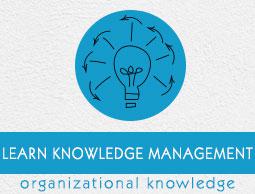Knowledge Management - Introduction
Knowledge management is the systematic management of an organization's knowledge assets for creating value and meeting tactical & strategic requirements. It consists of the initiatives, processes, strategies, and systems that sustain and enhance the storage, assessment, sharing, refinement, and creation of knowledge.
Each enterprise should define knowledge management in terms of its own business objectives. Knowledge management is all about applying knowledge in new, previously overburdened or novel situations.

Knowledge Management is a Continuous Cycle
Knowledge management is currently seen as a continuous cycle of three processes, namely −
- Knowledge creation and improvement
- Knowledge distribution and circulation
- Knowledge addition and application
Knowledge management expresses a deliberate, systematic and synchronized approach to ensure the full utilization of the company’s knowledge base, paired with the potential of individual skills, competencies, thoughts, innovations, and ideas to create a more efficient and effective company.
In simple words, knowledge management incorporates both holding and storing of the knowledge perspective, with respect to the intellectual assets.
It is the deliberate and systematic collaboration of an organization’s people, technology, processes, style and structure in order to add value through reuse and innovation.
Knowledge Management Theory
There are three distinct perspectives on Knowledge Management which leads to a different estimation and a different definition.

Knowledge management is a business activity with two primary aspects −
Executing the knowledge component of business activities as an explicit concern of business in strategy, policy, and practice at all levels of the organization.
Maintaining a direct link between an organization’s intellectual assets both explicit (recorded) and tacit (personal know-how) and positive business results.
What Cognitive Science or Knowledge Science Perspective Says?
Knowledge management is the transformation of knowledge in the form of insights, understandings, and practical know-how that we all possess in other manifestations like books, technology, practices, and traditions within organizations of all kinds and in society in general.
According to the Process/Technology Perspective
Knowledge management is the concept under which information is changed into actionable knowledge and made available effortlessly in a usable form to the people who can leverage it according to their needs.
Why Knowledge Management
Application of Knowledge Management (KM) lie in the below four key areas
Globalization of Business − Organizations today are more universal i.e., they are operating in multiple sites, multilingual, and multicultural in nature.
Leaner Organizations − Organizations are adopting to a lean strategy where they understand customer value and focus on key processes to continuously increase it. The ultimate goal is to provide perfect value to the customer through a perfect value creation process that has zero waste.
Corporate Amnesia − We are freer as a workforce, which creates issues regarding knowledge continuity for the organization and places with continuous learning demands from knowledge worker. We no longer expect to spend our entire work life with the same organization.
Technological Advances − The world is more connected with the advent of websites, smart phones and other latest gadgets. Advancements in technology has not only helped in better connectivity but also changed expectations. Companies are expected to have online presence round the clock providing required information as per the customer needs.
Knowledge Management serves as one of the major response to the challenge of trying to handle this complex, information overloaded work environment. As such, Knowledge management is perhaps best clustered as a science of complexity.




